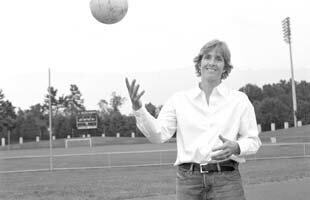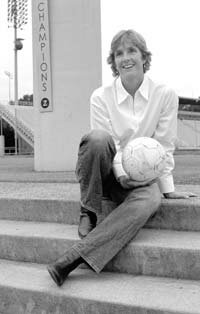Swanson's song: Sports fiction eases grief
It's the summer before her senior year in high school, and Leah Weicznkowski has just made the regional Olympic development team in the under-18 division soccer. She's blistered, sunburned, tired beyond belief, but ecstatic. College coaches will be recruiting her to play for some of the best schools in the country. On the way home from the week-long tryouts, though, her father breaks the news: He has cancer. The doctor has given him three months to live.
From the first pages of Julie Swanson's new young adult novel, Going for the Record (published in March by Eerdmans Books), readers can tell the author followed the write-what-you-know principle in this, her first published book. But while it's true her father died of cancer in the fall of 1995, Swanson has never actually played soccer competitively.
"I was a basketball player who was obsessed like Leah," Swanson explains.
But early in her writing career, she attended a conference where she met Rich Wallace, a writer of sports novels for boys. In a conversation over dinner, Wallace advised Swanson that her first forays into fiction should not involve her own sport. It's too hard to distance yourself from what really happened to make it fiction, Wallace told her. He suggested she choose something else that she knows a lot about.
So how does Swanson know so much about the drills, the scrimmages, and the culture of soccer? Swanson's husband, Steve, is coach of the UVA women's soccer team.
"Between watching his players and hearing about them every day of my life"– they have three kids who play too– "I really know what it's like," she says.
Swanson, who just turned 40, started out as a math teacher, then coached women's basketball at Dartmouth College for a year before her first child was born.
"I always wanted to write," Swanson says, "and when I stayed at home with our first child, I thought, 'Now I'll get into it. I'll write while she's napping.'"
When Wallace suggested she write a sports novel, Swanson didn't have to think for a minute what it would be about. It was six months after her father's death, and she was still grieving and couldn't find enough to read about death and dying. But the books she found seemed too superficial. She wanted something deeper.
"You have so many selfish and guilty thoughts when someone you love is dying," Swanson says. "I just found comfort in reading about it. You see other people have the same thoughts. I wrote the book because of what a powerful event my father's illness was for me... and hopefully to inspire others."

Julie Swanson
PHOTO BY JEN FARIELLO

PHOTO BY JEN FARIELLO
#